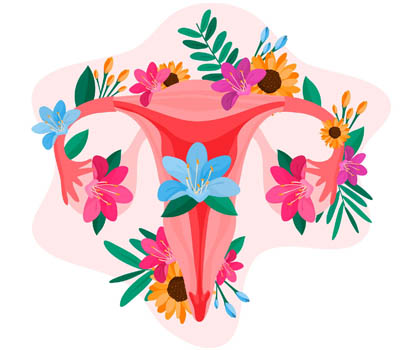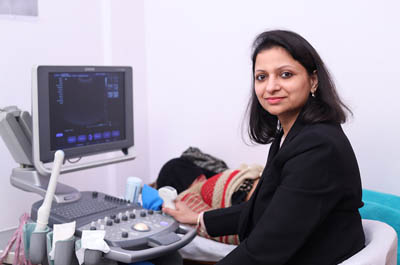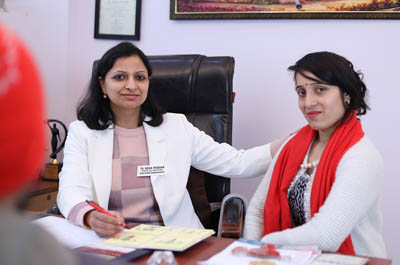
Cervical Cancer: Prevention, Screening, and Treatment at Precision Gynaecology with Dr. Neha Poddar
Cervical cancer is a preventable cancer that develops in the cells of the cervix, the lower part of the uterus that connects to the vagina. The Human Papillomavirus (HPV) is the most common risk factor for cervical cancer.
At Precision Gynaecology, Dr. Neha Poddar is dedicated to women's health and offers comprehensive care for cervical cancer prevention, screening, and treatment.

Here's a breakdown of what Dr. Poddar can offer you:
HPV Vaccination:
-
Importance: Vaccination against HPV is the most effective way to prevent cervical cancer.
-
Eligibility: The HPV vaccine is recommended for both girls and boys at ages 9 - 26 years. Can safely be given upto age of 45 years.
-
Dr. Poddar can discuss the HPV vaccine in detail and determine if it's right for you.
Cervical Cancer Screening:
Early Detection is Key: Regular cervical cancer screening can detect precancerous cells before they turn cancerous, allowing for early intervention and successful treatment.
Screening Options: Dr. Poddar offers various screening options depending on your age and risk factors. These may include:
-
Pap test: A Pap test examines cells collected from the cervix to detect abnormalities.
-
HPV test: This test checks for the presence of the HPV virus, which can cause cervical cancer.
-
Colposcopy: If your Pap test or HPV test results are abnormal, Dr. Poddar may recommend a colposcopy, which involves using a magnifying instrument to examine the cervix more closely.
Treatment Options (if necessary):
While Dr. Poddar prioritizes prevention and early detection, if cervical cancer is diagnosed, she can provide treatment options tailored to your specific situation. Treatment options may include:
-
Surgery: Depending on the stage of cancer, removal of the cervix or uterus may be necessary.
-
Radiation Therapy: High-energy rays target and destroy cancer cells.
-
Chemotherapy: Medications are used to kill cancer cells throughout the body.


Remember, cervical cancer is highly preventable. Here's what you can do:
-
Get vaccinated against HPV.
-
Schedule regular cervical cancer screenings as recommended by Dr. Poddar.
-
Maintain a healthy lifestyle, including regular exercise and a balanced diet.
-
Practice safe sex by using condoms consistently.
Don't wait until you experience symptoms. Schedule an appointment with Dr. Poddar at Precision Gynaecology to discuss your risk factors, screening options, and the importance of cervical health.
FAQS
Cervical cancer screening is a preventive health measure that involves testing for early signs of cervical cancer or precancerous changes in the cervix. The most common screening method is the Pap test (Pap smear), which involves collecting cells from the cervix for examination under a microscope. At Precision Gynaecology, Dr. Neha Poddar recommends regular cervical cancer screening for women starting at age 21 or as advised based on individual risk factors.
The HPV vaccine protects against human papillomavirus (HPV) infection, which is the leading cause of cervical cancer. It is recommended for both boys and girls starting at age 9 to 12, before they become sexually active. The vaccine is also recommended for young women up to age 26 and young men up to age 21 who have not previously been vaccinated. Dr. Neha Poddar can provide guidance on HPV vaccination and its importance in cervical cancer prevention at Precision Gynaecology.
The frequency of cervical cancer screening depends on various factors such as age, medical history, and previous screening results. In general, Dr. Neha Poddar recommends Pap tests every three years for women aged 21 to 29. For women aged 30 to 65, Pap tests combined with HPV testing (co-testing) are recommended every five years. However, individual recommendations may vary, so it's important to consult with Dr. Poddar at Precision Gynaecology for personalized screening guidelines.
Yes, cervical cancer screening is still necessary even if you've received the HPV vaccine. While the vaccine provides strong protection against certain HPV strains, it does not protect against all types that can cause cervical cancer. Therefore, regular screening remains an essential part of cervical cancer prevention. Dr. Neha Poddar can discuss the importance of ongoing screening and vaccination in cervical cancer prevention during your visit to Precision Gynaecology.
- General Gynae
- Menstrual Disorders
- Vaginal discharge
- Cervical Cancer - Screening & Vaccination
- Pelvic inflammatory disease (PID)
- Infertility treatment (IVF & IUI)
- Uterine polyps
- Septate Uterus (Uterine Septum)
- Uterine Fibroids
- Ovarian Cysts
- Dermoid Cysts
- Ectopic Pregnancy
- Endometriosis
- Menopause
- Hormonal Disorders
- PCOS and Hyperprolactinemia
- Gynae Endoscopy
- Uro Gynae
Are you seeking a qualified and experienced gynecologist and obstetrician in Ghaziabad? Look no further than Dr. Neha Poddar!
- Call 9318413696, 9958170476
- Whatsapp 9318413696

Doctors
-

Dr. Madhu Poddar
-

Dr. R.K. Poddar
-

Dr. Neha Poddar
-

Dr. Rahul Poddar